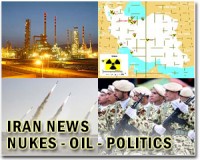 |
Istanbul (AFP) Dec 23, 2010 Iranian President Mahmoud Ahmadinejad joined regional leaders Thursday for a summit in Istanbul, where he urged world powers to choose cooperation over confrontation in nuclear talks due here next month. "We think this meeting will be very important," Ahmadinejad told a news conference in Istanbul, which will host the talks between six world powers and Iran, expected to be held in late January. The talks would be the second round between the Islamic Republic and the six -- Britain, China, France, Russia, the United States and Germany -- after negotiations resumed in Geneva earlier this month following a 14-month hiatus. "We have suggested that in the forthcoming Istanbul meeting confrontation be replaced with cooperation and... this will be in the interest of all sides," he said through an interpreter. "In cooperation we will have a win-win situation. There is no failure or defeat for any party. "So we think the Istanbul meeting will be a historical and landmark event and we can replace confrontation with cooperation," he said. The West suspects that Tehran is developing am atomic bomb under the guise of a nuclear energy programme. Iran denies the charges and insists its activities have a purely peaceful purpose. The United Nations, the United States and the European Union recently slapped a series of new sanctions on Tehran over its refusal to suspend uranium enrichment, the sensitive process which can be used to make nuclear fuel or, in highly extended form, the fissile core of an atom bomb. Ahmadinejad had earlier Thursday attended the summit of the 10-member Economic Cooperation Organisation (ECO), accompanied by his new foreign minister Ali Akbar Salehi, who is also Iran's nuclear chief. Salehi was appointed interim foreign minister last week after Ahmadinejad sacked Manouchehr Mottaki in a surprise move signalling an apparent falling out over nuclear policy. Turkish Foreign Minister Ahmet Davutoglu said discussions with the Iranians on the upcoming talks aimed to ensure that "the positive atmosphere that emerged (at the first round) in Geneva is sustained" in Istanbul. He refused to claim any mediation role, stressing that Turkey would only host the gathering. "But if the two sides agree to ask Turkey for any kind of support, we are always ready to give it," he told reporters. "The objective is clear: to free the world and the region from nuclear threats." Turkey's Islamist-rooted government has established close ties with Tehran, insisting on a diplomatic solution to the nuclear row and reluctant to back a tougher line against the Islamic republic, its eastern neighbour. In May, together with Brazil, it hammered out a nuclear fuel swap deal with Iran but the United States dismissed the accord. The following month, Turkey refused to back fresh sanctions against Tehran, adopted at the UN Security Council in New York, insisting that the swap deal should be given a chance. Its "no" vote irked the United States and raised concern that NATO's sole Muslim-majority member is sliding away from the West, charges that Ankara vehemently denies. Thursday's summit was attended by presidents Hamid Karzai of Afghanistan, Ilham Aliyev of Azerbaijan, Roza Otunbayeva of Kyrgyzstan, Asif Ali Zardari of Pakistan and Emomali Rahmon of Tajikistan, as well as Kazakh Prime Minister Karim Masimov. Iraqi President Jalal Talabani participated as a guest. The ECO, which promotes regional trade and economic development, also includes Turkmenistan and Uzbekistan, which sent lower-level officials. In his opening speech, Turkish President Abdullah Gul lamented that the group was faltering in efforts to expand commercial links, stressing intra-regional trade had increased only from six to seven percent since 2005, undermining the 2015 target of 20 percent. "It should be understood that the way to economic stability and sustainable development for our countries goes through economic and commercial cooperation in the region," he said. The 10 member states cover an area of about eight billion square kilometres (three billion square miles), rich with natural resources, and represent some 400 million people.
Share This Article With Planet Earth
Related Links Learn about nuclear weapons doctrine and defense at SpaceWar.com Learn about missile defense at SpaceWar.com All about missiles at SpaceWar.com Learn about the Superpowers of the 21st Century at SpaceWar.com
 Nigeria grants bail to Iranian over arms seizure: reports
Nigeria grants bail to Iranian over arms seizure: reportsAbuja (AFP) Dec 23, 2010 A Nigerian court granted bail Thursday to an Iranian identified as a member of his country's Revolutionary Guards and charged over an illegal arms cache seized in October, local media reported. Azim Aghajani had been identified in court papers as a businessman and "member of IRGC," an abbreviation for the Iranian Revolutionary Guard Corps, the military and economic force in Iran. He was ... read more |
|
| The content herein, unless otherwise known to be public domain, are Copyright 1995-2010 - SpaceDaily. AFP and UPI Wire Stories are copyright Agence France-Presse and United Press International. ESA Portal Reports are copyright European Space Agency. All NASA sourced material is public domain. Additional copyrights may apply in whole or part to other bona fide parties. Advertising does not imply endorsement,agreement or approval of any opinions, statements or information provided by SpaceDaily on any Web page published or hosted by SpaceDaily. Privacy Statement |